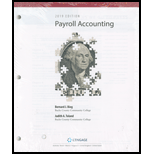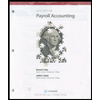
PAYROLL ACCT.,2019 ED.(LL)-TEXT
19th Edition
ISBN: 9781337619783
Author: BIEG
Publisher: CENGAGE L
expand_more
expand_more
format_list_bulleted
Question
Chapter 4, Problem 2CP
To determine
State whether it is a violation of IRS rule by Company Y for paying salary and fees to Person J.
Expert Solution & Answer
Trending nowThis is a popular solution!

Students have asked these similar questions
not use ai solution given answer General accounting
On June 15, 2022, Dom Manufacturing had an employee, Daniel, who worked 5 hours on Job B-3 and 3.5 hours on general overhead activities. Daniel is paid $18 per hour. Overhead is applied based on $28 per direct labor hour. Additionally, on June 15, Job B-3 requisitioned and entered into production $275 of direct material. Daniel, while working on Job B-3, used $35 of an indirect material. Indirect material is included in the overhead application rate. Use this information to determine the total cost that should have been recorded in Work in Process for Job B-3 on June 15.
What is the operating cycle?
Chapter 4 Solutions
PAYROLL ACCT.,2019 ED.(LL)-TEXT
Ch. 4 - Prob. 1SSQCh. 4 - Prob. 2SSQCh. 4 - Prob. 3SSQCh. 4 - Prob. 4SSQCh. 4 - Prob. 5SSQCh. 4 - Prob. 6SSQCh. 4 - Prob. 1MQCh. 4 - Prob. 1QRCh. 4 - Prob. 2QRCh. 4 - Prob. 3QR
Ch. 4 - What is the maximum contribution that an employer...Ch. 4 - Prob. 5QRCh. 4 - Prob. 6QRCh. 4 - Prob. 7QRCh. 4 - Prob. 8QRCh. 4 - Prob. 9QRCh. 4 - Prob. 10QRCh. 4 - Prob. 11QRCh. 4 - Prob. 12QRCh. 4 - Prob. 13QRCh. 4 - Trowbridge Company has just completed the...Ch. 4 - Prob. 15QRCh. 4 - Prob. 16QRCh. 4 - Prob. 17QRCh. 4 - Prob. 18QRCh. 4 - Prob. 19QRCh. 4 - Prob. 20QRCh. 4 - Prob. 1QDCh. 4 - Prob. 2QDCh. 4 - Prob. 3QDCh. 4 - Prob. 4QDCh. 4 - Prob. 5QDCh. 4 - Justin Holmes, an ex-employee, is entitled to a...Ch. 4 - Prob. 1PACh. 4 - Prob. 2PACh. 4 - Prob. 3PACh. 4 - Prob. 4PACh. 4 - Prob. 5PACh. 4 - Prob. 6PACh. 4 - Prob. 7PACh. 4 - Prob. 8PACh. 4 - Prob. 9PACh. 4 - Mattola Company is giving each of its employees a...Ch. 4 - Prob. 11PACh. 4 - Prob. 12PACh. 4 - Prob. 13PACh. 4 - Prob. 1PBCh. 4 - Prob. 2PBCh. 4 - Prob. 3PBCh. 4 - Prob. 4PBCh. 4 - Prob. 5PBCh. 4 - Prob. 6PBCh. 4 - Prob. 7PBCh. 4 - Prob. 8PBCh. 4 - Prob. 9PBCh. 4 - Harrington Company is giving each of its employees...Ch. 4 - Prob. 11PBCh. 4 - During the fourth quarter of 2019, there were...Ch. 4 - Prob. 13PBCh. 4 - Prob. 1CPCh. 4 - Prob. 2CP
Knowledge Booster
Similar questions
- i need this question answer General accountingarrow_forwardnonearrow_forwardOn January 1, Jack Corp.'s Work-in-Process Inventory account had a balance of $29,600. During the year, $62,400 of direct materials was placed into production. Manufacturing wages incurred amounted to $88,500, of which $66,000 were for direct labor. Manufacturing overhead is allocated on the basis of 125% of direct labor cost. Actual manufacturing overhead was $92,800. Jobs costing $230,700 were completed during the year. What is the December 31 balance of Work-in-Process Inventory?arrow_forward
arrow_back_ios
SEE MORE QUESTIONS
arrow_forward_ios
Recommended textbooks for you





